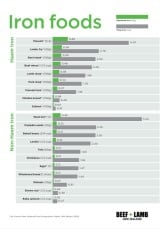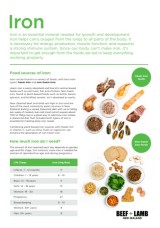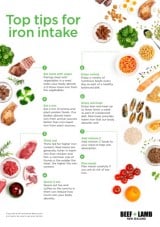If you're a frequent visitor to Healthify, why not share our site with a friend? Don't forget you can also browse Healthify without using your phone data.
Iron
Key points about iron
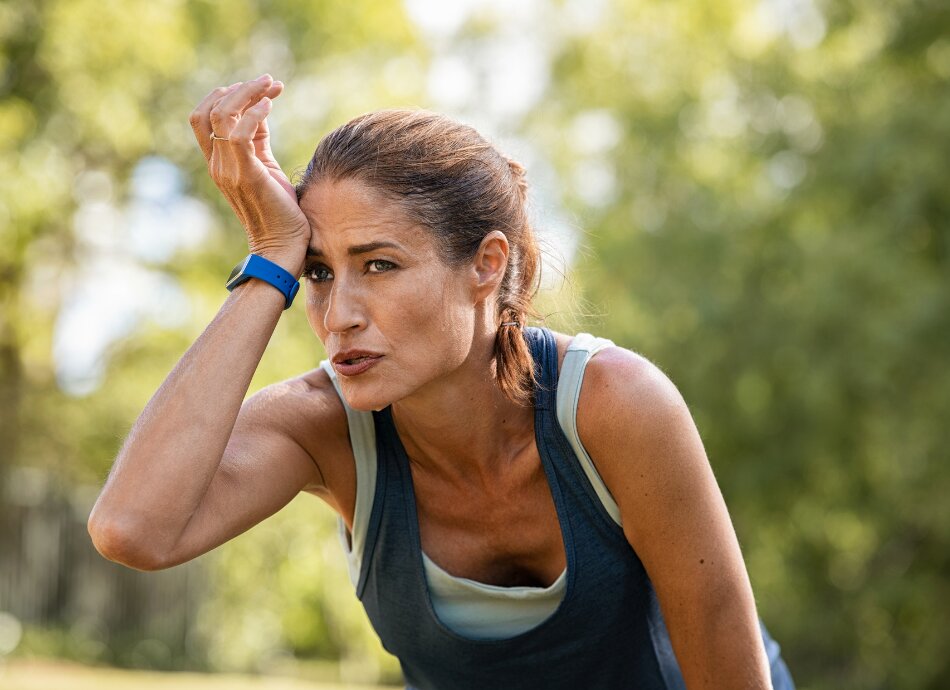
Iron is a mineral that's essential for making red blood cells and muscle cells. It's involved in many of your body's normal functions and systems, including:
- transporting oxygen in your blood around your body
- muscle function and energy production
- supporting your immune system.
Iron also supports healthy brain development, particularly during pregnancy and childhood.
By eating a varied and balanced diet most people should be able to get enough iron, but there are certain groups who are at risk of not getting enough iron (see below).
There are 2 forms of iron – haem and non-haem. Haem iron is only found in animal foods and non-haem is found in both plant and animal foods. Your body absorbs haem iron from animal foods more easily than non-haem.
The best food sources of iron are haem iron foods
- Lean beef and lamb (the redder the meat, the more iron there is in it).
- Venison.
- Kidney.
- Liver, but limit this to 100 g once a week if you're pregnant.
- Chicken, fish and seafood, such as paua and mussels.
- Egg yolk.
Other foods with non-haem iron
- Grains – porridge, oats, wholegrain breads.
- Chickpeas, beans, lentils.
- Vegetables – greens (eg, spinach, silverbeet, lettuce), beans and peas, pumpkin and sweet potatoes.
- Some nuts.
- Iron-fortified breakfast cereals (eg, Weetbix/ fortified infant cereals).
The amount of iron you need each day depends on your age. The following is the recommended dietary intake (RDI) of iron for people of different age groups.
Recommended dietary intake (RDI)
Babies
- 0 to 6 months: 0.2 mg (this is the AI or adequate intake which is the recommended average daily intake of a nutrient used when there isn't enough information to determine the recommended dietary intake. This applies to young babies).
- 7 to 12 months: 11 mg
Children
- 1 to 3 years: 9 mg
- 4 to 8 years: 10 mg
- 9 to 13 years: 8 mg
Teenagers
- Boys 14 to 18 years: 11 mg
- Girls 14 to 18 years: 15 mg
Adults
- Men 19+ years: 8 mg
- Women 19 to 50 years: 18 mg
- Women over 50 years: 8 mg
- Pregnant women: 27 mg
- Breastfeeding women 14 to 18 years: 10 mg*
- Breastfeeding women 19+ years: 9 mg*
* Note: The recommendation is based on the assumption that breastfeeding women are not menstruating (getting their period) for the first 6 months of exclusive breastfeeding.
Testing
Iron levels can be tested with a simple blood test. A ferritin test is the blood test used to check the levels of iron stored in your body. Read more about ferritin tests.
Having not enough or too much iron in your body can create problems with your health.
Low iron or iron deficiency anaemia is a common problem in Aotearoa New Zealand. If you don't have enough iron in your body you may:
- feel very tired
- find it hard to think and concentrate
- find it harder to learn
- be more at risk of infections and illnesses
- feel the cold more than others.
Iron overload or haemochromatosis occurs when too much iron builds up in your body. Most people who get this condition have a genetic disorder passed down through families that leads to problems controlling iron absorption and iron levels.
Your iron needs change over your lifetime, and not getting enough is common.
Your risk of iron deficiency is greater if you:
- are a child or young person and still growing
- lose blood from menstruation (periods), especially if you have heavy periods
- are pregnant as you need more iron when you're hapū
- are an athlete or very active as you can lose iron from strenuous exercise and changed eating patterns
- are vegetarian or vegan, because you may not eat enough iron-containing foods
- have a condition affecting how your gut absorbs iron from what you eat, eg, from coeliac disease
- are on a restrictive diet.
- Choose a variety of foods – have food from all the 4 main food groups every day.
- Eat lean red meat, with fat and skin removed, regularly – at least 3 times a week. A serving is the size and thickness of the palm of your hand.
- Eat meat, chicken or fish and vegetables together. Meat, chicken and fish help your body absorb the iron in vegetables.
- Get plenty of vitamin C. It can help you absorb up to 4 times as much iron. You can get vitamin C from many fruits (berries, feijoas, kiwifruit, mandarin, orange, rock melon and tamarillo) and vegetables (broccoli, capsicum, cauliflower and tomato).
- Try to include fruit or vegetables with every meal, especially if you're vegetarian or vegan.
- Eat a variety of plant foods if you're vegetarian or vegan – have plenty of green leafy vegetables and wholegrains. Regularly include legumes, tofu, tempeh, nuts and seeds.
- Keep your meals tannin-free. The tannin in tea and coffee stops your body from absorbing as much iron. Drink tea and coffee between meals rather than with meals.
Vitamin C can increase the absorption of non-haem iron. So when you eat plant foods that contain iron, you should also eat foods high in vitamin C, such as kiwifruit, citrus fruit, tomatoes and broccoli.
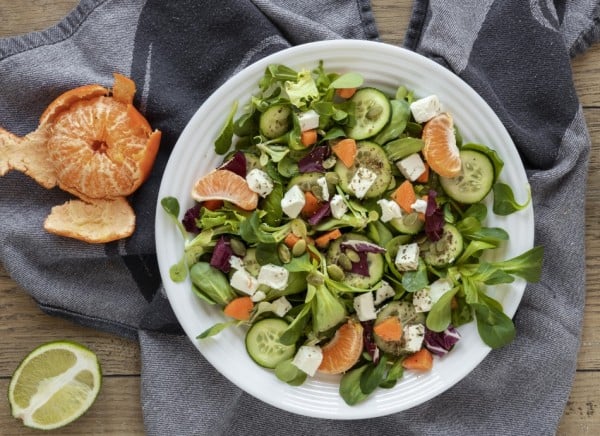
Image credit: Freepik
Eat meat, chicken or fish and vegetables together. Meat, chicken and fish help your body absorb the iron in vegetables.
If you have low iron levels, wait for 1 to 2 hours before drinking tea, coffee, red wine or milk. The tannins in tea, coffee and red wine can stop iron being absorbed, as can calcium from milk.
If you have signs of low iron talk to your healthcare provider or dietitian about iron supplementation. Taking 20 mg or less a day of an iron supplement is unlikely to cause harm, but won’t be enough to correct iron deficiency (in adults). Higher doses should be taken only under the supervision of your healthcare provider or dietitian.
Iron supplements to treat deficiency contain the high doses necessary to boost iron levels, however for some people they can cause:
- constipation (hard poo)
- nausea (feeling sick)
- vomiting (being sick)
- stomach pain.
If you need iron supplements follow the advice of your healthcare provider or dietitian and let them know if you have any of the above side effects after taking your supplement. Read more about iron supplements.
Keep all iron supplements out of the reach of children. Very high doses of iron can be very dangerous for children.
Safe and healthy eating in pregnancy(external link) HealthEd, NZ, 2023
Eating for healthy vegetarians | Ngā kai tōtika mā te hunga puku-huawhenua(external link) HealthEd, NZ, 2019
Brochures
Iron(external link) Beef + Lamb New Zealand, NZ, 2025
Iron foods(external link) Beef + Lamb New Zealand, NZ, 2021
Top tips for iron intake(external link) Beef + Lamb New Zealand, NZ
Fuelled by iron(external link) Beef + Lamb New Zealand, NZ, 2025
References
- Food and nutrition guidelines(external link) Health New Zealand | Te Whatu Ora
- Iron(external link) Eat for Health, Australia
- Low iron and iron deficiency anaemia(external link) Health New Zealand | Te Whatu Ora, NZ
Brochures
Credits: Healthify editorial team. Healthify is brought to you by Health Navigator Charitable Trust.
Reviewed by: Anna Sloan, Advanced Dietitian, Auckland; Lily Henderson, Registered Dietitian
Last reviewed:


